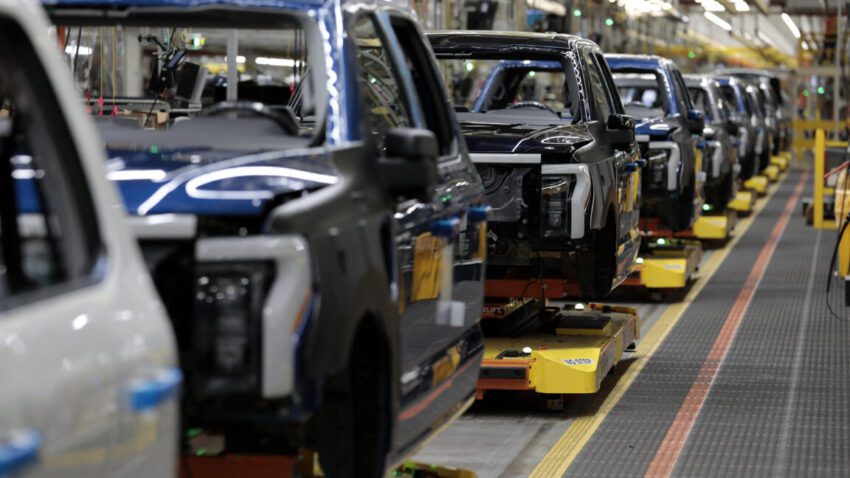
ford says no exact date to restart Ford has announced that there is “no exact date” for the resumption of production of its F-150 Lightning electric pickup truck, raising concerns about the future of the model.
ford says no exact date to restart
Overview of the F-150 Lightning
The Ford F-150 Lightning represents a significant step for the automotive industry, particularly in the realm of electric vehicles (EVs). Launched as the electric variant of Ford’s best-selling F-150 pickup truck, the Lightning has garnered attention for its impressive performance metrics and innovative features. While it maintains a similar aesthetic to its gasoline and diesel counterparts, the Lightning distinguishes itself with enhanced speed, smoother handling, and a notable increase in energy efficiency.
Equipped with dual electric motors, the F-150 Lightning can accelerate from 0 to 60 mph in just over four seconds, showcasing its capability as not just a utility vehicle but also a performance-oriented option. Furthermore, its electric powertrain allows for a significant reduction in carbon emissions, aligning with the growing consumer demand for sustainable transportation solutions.
Current Production Challenges
Despite its promising attributes, the future of the F-150 Lightning is now shrouded in uncertainty. A recent report from The Wall Street Journal has indicated that Ford’s management is engaged in “active discussions about scrapping” the Lightning. This news follows a temporary suspension of production due to an aluminum shortage, which was exacerbated by a fire at a supplier’s factory in New York. The incident has had far-reaching implications, with Ford estimating potential losses of up to $2 billion as a result of the disruption.
Impact of the Aluminum Shortage
The aluminum shortage is particularly critical for the F-150 Lightning, as aluminum is a key material used in its construction. The lightweight nature of aluminum contributes to the vehicle’s efficiency and performance, making it an essential component for electric vehicles that prioritize range and speed. The fire at the supplier’s facility not only disrupted the supply chain but also highlighted the vulnerabilities inherent in the automotive manufacturing process, especially as the industry shifts toward more sustainable materials.
Financial Implications for Ford
The potential financial impact of these production challenges cannot be overstated. With losses projected at $2 billion, Ford faces significant pressure to navigate these difficulties while maintaining its competitive edge in the EV market. The F-150 Lightning has been a cornerstone of Ford’s strategy to electrify its vehicle lineup, and any prolonged disruption could hinder the company’s overall growth in the electric vehicle sector.
Market Position and Competition
Despite the current challenges, Ford has emphasized that the F-150 Lightning remains the best-selling electric pickup truck in the United States. The vehicle has achieved record sales in the third quarter of this year, even in the face of increasing competition from other electric truck manufacturers. Rivals such as Tesla’s CyberTruck, as well as offerings from Chevrolet, GMC, and Hummer, have entered the market, intensifying the competition for consumer attention and market share.
Consumer Demand for Electric Trucks
The growing consumer interest in electric trucks is a significant factor influencing Ford’s strategy. As more consumers seek environmentally friendly alternatives to traditional pickup trucks, the demand for electric options is expected to rise. The F-150 Lightning has capitalized on this trend, appealing to both traditional truck buyers and environmentally conscious consumers. Its combination of performance, utility, and sustainability has positioned it as a leader in the electric truck segment.
Ford’s Response to Speculation
In response to the speculation surrounding the future of the F-150 Lightning, Ford has refrained from commenting on potential changes to its product plans. However, the company has reiterated its commitment to the electric vehicle market, emphasizing the importance of the F-150 Lightning in its overall strategy. Ford’s management has indicated that they are closely monitoring the situation and will make decisions based on market conditions and consumer demand.
Stakeholder Reactions
The uncertainty surrounding the F-150 Lightning has elicited a range of reactions from stakeholders, including investors, consumers, and industry analysts. Investors are particularly concerned about the potential financial ramifications of the production halt, as the electric vehicle market is seen as a key growth area for Ford. Analysts have noted that any long-term disruption could impact Ford’s ability to compete effectively in the rapidly evolving automotive landscape.
Consumer Sentiment
Consumer sentiment regarding the F-150 Lightning remains largely positive, with many potential buyers expressing interest in the vehicle’s capabilities and features. However, the uncertainty regarding production timelines may lead some consumers to reconsider their purchasing decisions. As competitors continue to launch new electric truck models, Ford must act swiftly to reassure consumers and maintain its market position.
Industry Implications
The challenges faced by Ford are indicative of broader trends within the automotive industry. As manufacturers increasingly pivot toward electric vehicles, supply chain vulnerabilities have become more pronounced. The aluminum shortage and its impact on the F-150 Lightning serve as a cautionary tale for other automakers, highlighting the need for robust supply chain management and contingency planning.
Looking Ahead
As Ford navigates these challenges, the future of the F-150 Lightning remains uncertain. The company is likely to continue assessing its production capabilities and market conditions before making any definitive decisions regarding the model’s future. The ongoing discussions within Ford’s management team will play a crucial role in determining whether the F-150 Lightning will continue to be a key player in the electric truck market or if it will be phased out in favor of other models.
Potential Strategies for Recovery
To mitigate the impact of the current challenges, Ford may consider several strategies. These could include diversifying its supplier base to reduce reliance on specific materials, investing in alternative manufacturing processes, and enhancing its inventory management systems. Additionally, Ford may explore partnerships with other companies to bolster its supply chain resilience and ensure a steady flow of essential materials.
Conclusion
The F-150 Lightning has the potential to reshape the electric vehicle landscape, but its future is currently in jeopardy due to production challenges and supply chain disruptions. As Ford grapples with these issues, the company’s ability to adapt and respond to market demands will be critical in determining the fate of its electric pickup truck. Stakeholders will be closely monitoring developments as Ford seeks to navigate this complex landscape and maintain its position as a leader in the electric vehicle market.
Source: Original report
Was this helpful?
Last Modified: November 7, 2025 at 11:38 pm
1 views















